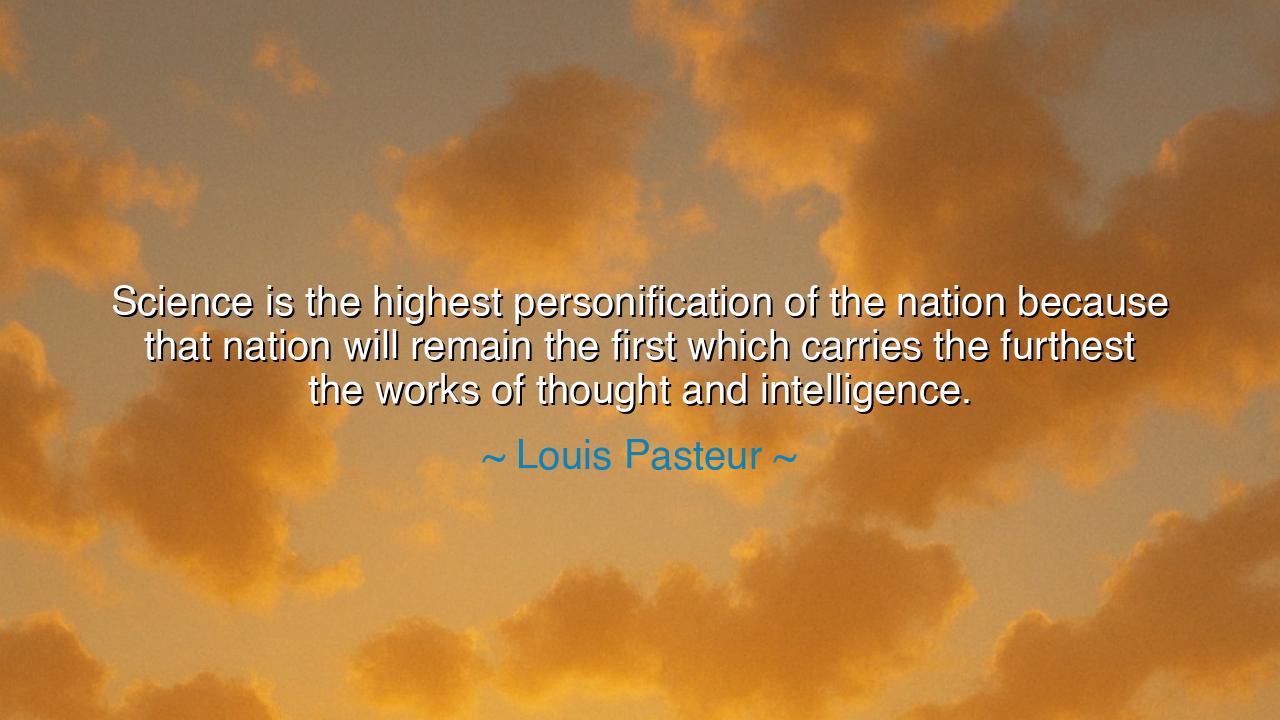
Science is the highest personification of the nation because that
Science is the highest personification of the nation because that nation will remain the first which carries the furthest the works of thought and intelligence.






The words of Louis Pasteur, the great savior of both science and humanity, rise like a hymn to reason and progress: “Science is the highest personification of the nation because that nation will remain the first which carries the furthest the works of thought and intelligence.” In these words, we hear not merely the pride of a patriot, but the reverence of a man who believed that knowledge itself is the truest foundation of national greatness. For to Pasteur, science was not cold calculation, but the living soul of civilization — the force that elevates a people from ignorance to enlightenment, from survival to immortality.
Born in France in the 19th century, Pasteur lived in an age when nations measured their power by armies and empires. Yet he saw a truth greater than conquest: that the true triumph of a nation lies not in the reach of its weapons, but in the reach of its mind. Cannons rust, empires crumble, but the discoveries of science endure — each a beacon to future generations. He who creates knowledge creates eternity. And so, when Pasteur spoke of science as the personification of the nation, he meant that in the laboratories, the libraries, and the minds of thinkers, a nation reveals its noblest form — not its greed for power, but its hunger for truth.
Consider the life of Pasteur himself, a testament to his own words. When disease ravaged the farms and families of France, he did not seek glory in battlefields but in beakers. Through tireless thought and intelligence, he discovered the principles of vaccination and the mysteries of microbes — invisible enemies that had conquered humankind for millennia. His discovery that life does not spring from decay, but from living causes, overturned the beliefs of centuries. And when he developed the vaccine against rabies, he not only saved lives — he restored faith in the power of science as the protector of the people. Thus, the nation that fosters knowledge becomes the guardian of life itself.
But Pasteur’s wisdom goes beyond patriotism; it is a warning wrapped in honor. For he saw that nations rise and fall not by strength alone, but by intellect. A land that neglects its thinkers, that silences its dreamers and scientists, becomes rich in pride but poor in future. The armies of ignorance are relentless, and they march within every generation. Only science, the discipline of truth, can withstand them. It is the armor of civilization. It teaches us not merely to invent, but to understand; not merely to create, but to question; not merely to survive, but to advance.
Let us remember, too, that science is not merely the work of laboratories — it is the spirit of inquiry that dwells within every mind that seeks to know. When a nation honors curiosity, when it educates its children not just to obey but to wonder, then it plants the seeds of immortality. Greece shone brightest not when its armies conquered, but when its philosophers asked, “What is truth?” The Renaissance rose not from royal decree, but from the daring of thinkers who sought knowledge against fear. Every age of light is born from the courage to think.
The lesson that Pasteur offers us is both noble and urgent: if you would serve your nation, serve the cause of intelligence. Defend truth as you would defend your homeland. Build schools before monuments, libraries before palaces, laboratories before fortresses. Encourage the young to question, to create, to seek. For a people that worships ignorance, even in comfort, is doomed to decline; but a people that loves knowledge, even in hardship, will rise forever. The strength of a nation is the strength of its thinkers, and its truest victory is the conquest of the unknown.
Therefore, O seeker of wisdom, honor the works of thought. Cherish science, for it is the flame that dispels darkness — not the darkness of the world, but the deeper darkness within the mind. Let your curiosity be your offering to your country, your study your act of service. For every idea born in truth is a fortress built against oblivion. And remember Pasteur’s immortal teaching: that the nation which carries furthest the works of thought and intelligence shall remain not only the first among others, but the first among time itself — eternal in spirit, and sovereign in wisdom.






AAdministratorAdministrator
Welcome, honored guests. Please leave a comment, we will respond soon